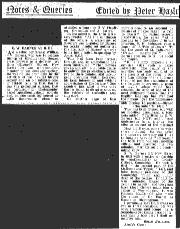1955
THURSDAY 22nd SEPTEMBER
Grace Archer is dead!The new Plan came this morning. I am down to preach at Nether Whitacre, Gospel Lane and Yardley Green Road. One of these is on Temperance Sunday. The team is planned for Yardley Green Road that day. Mr Jones [Rev. Arnold B. Jones] is not once down for Acocks Green. At work I continued my experiment on Pelargonylcholine Iodide. What a sensation tonight! Grace Archer got bumped off. I don’t usually listen to The Archers but yesterday there was a fire in the stables. Grace went in to rescue the horses, and was struck by a falling beam. Then there was a scene where Grace and Phil were going to hospital in the ambulance, and listeners heard her say, “Phil, I love you, Phil.” The programme ended with Phil breaking the news that Grace had died in his arms. I felt astonishingly depressed. I seemed to see Freda and me instead of Grace and Phil. I was glad I was spending the evening with her. The Archers may be very true to life. But this latest idea is stupid. NO one wants the hero to kick the bucket. As I wrote in an article [letter] to the Evening Despatch:—
[The letter appears in the Evening Despatch on Monday 26th]. |
...
|
<#551011#> |
TUESDAY 11th OCTOBER 1955
Ralph Vaughan WilliamsThis evening’s CBSO concert was an event which Freda and I will be able to look back upon as one of the outstanding of our musical memories. This was perhaps the last time we should be able to see and hear Dr Ralph Vaughan Williams conduct one of his own works. I would not have missed it for anything. Mr & Mrs Powley were going to see Ro in hospital so they dropped us off in town. We had 5/6d reserved seats G39 and 40 in the Lower Gallery of the Town Hall. The programme started with the National Anthem, then Vaughan Williams conducted his own Serenade to Music with the B.B.C. Midland Singers, including Ann Pardoe. It is one of the most beautiful pieces one could ever hear. Vaughan Williams wrote it as a gift for Sir Henry Wood on the occasion of his Jubilee Concert at the Royal Albert Hall on Wednesday 5th October 1938, and the words are from Shakespeare’s The Merchant of Venice, Act V, Scene 1. The Serenade to Music lasted only a quarter of an hour. Vaughan Williams received a great ovation and then left the platform. I wished he could have stayed and conducted his Symphony No. 4 in F minor, but he is 83 and Rudolf Schwarz was conducting the rest of the programme, so we were happy just to have seen him. His 4th Symphony could not be more different from the Serenade to Music. Not having heard it before, we were surprised by the fortissimo introduction and the grim feeling of the music. But we were even more surprised when, a few minutes later, Vaughan Williams and his wife [Ursula] came and sat in the row in front of us, just to our left, with no one in between. He held a big ear-trumpet to his ear and listened intently to the performance of his symphony. The great composer and his wife left at the interval. The second half of the concert was devoted to Beethoven’s Symphony No. 7 in A, a perfect contrast to the Vaughan Williams. I see from the inside front cover of the programme that all seven of Vaughan Williams’ symphonies are available on Decca records, with the London Philharmonic Orchestra conducted by Sir Adrian Boult. I should rather like to have these. Sir Eugene Goossens is to conduct next month’s Tuesday concert with Rosalyn Tureck as soloist, and Rudolf Schwarz the December concert with Julius Katchen. |
...
|
|
FRIDAY 23rd DECEMBER 1955
Previous chapter || Next chapter || Index || Search
